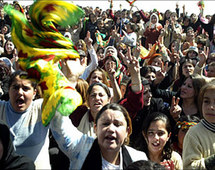Syrian Kurds naturalised as reform law drawn up
Sammy Ketz
DAMASCUS, Sammy Ketz- Syria on Thursday granted citizenship to tens of thousands of Kurds on the same day that a legal committee completed draft legislation to replace nearly five decades of emergency rule.
A Facebook group also called for a "peaceful sit-in until freedom" at the Damascus headquarters of the Baath party to coincide with its 64th anniversary and urged countrywide "resistance on Friday to demonstrate despite our wounds."

"President Assad issued a decree granting Arab Syrian citizenship to people registered as foreigners in the (governorate of Hassake)," it said.
The measure, which would benefit some 300,000 Kurds, came a week after Assad tasked a committee with "resolving the problem of the 1962 census" in Hassake.
In 1962, 20 percent of Syria’s ethnic Kurdish population were deprived of citizenship after a controversial census, according to human rights groups.
The government at the time argued its decision was based on a 1945 wave of illegal immigration from neighbouring states, including Turkey, to Hassake, where Kurds "fraudulently" registered as Syrian citizens.
The issue has long poisoned relations between Damascus and the Kurds, who were banned from public sector jobs because they are not citizens, and yet they cannot emigrate as they do not have Syrian passports.
Kurds in the northeast demonstrated last Friday for the first time since pro-reform protests erupted in mid-March, calling for the right to citizenship and "freedom as well," Kurdish rights activist Radif Mustafa told AFP.
Assad on Wednesday met a delegation from Hassake and "listened to their demands," according to SANA.
Also on Wednesday, the authorities released 48 Kurds detained in Raqqa on March 21 during Nowruz new year celebrations.
Mustafa on Thursday welcomed the citizenship move, but said this was not enough.
"Certainly it is a positive measure, but we will continue to demand our civic, political, cultural and social rights," he said.
Fuad Alliko, of the banned Kurdish Yakiti party, said their demands included the teaching of Kurdish in schools, cultural centres, and "being able to celebrate Kurdish festivals without being harassed by the security forces."
A politician close to the regime told AFP on condition of anonymity on Thursday that "jurists finished drafting new legislation to replace emergency law and presented their text to the regional leadership of the Baath party."
The lifting of emergency powers, in force since 1963 when the Baath took control, has been a central demand of anti-government protesters who have been calling for political reform and more freedoms since mid-March.
The law imposes restrictions on public gatherings and movement and authorises the detention and interrogation of any individual, as well as the surveillance of personal communications and media censorship.
Assad on Thursday also fired the governor of the industrial city of Homs, north of Damascus, where protests last Friday turned violent, SANA reported.
He was the second governor to be sacked in less than a month.
In hints at change ahead, state media have allowed contributions by opposition figures and more freedom of expression.
In a move unthinkable just weeks ago, human rights lawyer Haytham Maleh, 80, one of the political prisoners given a presidential pardon last month, wrote an opinion piece on the emergency law for the Baath party newspaper.
State television has also been granting air time to people to express their demands.
These are mainly social in character, but some have called for an end to the state of emergency and an article in the constitution enshrining the Baath party as leader of both the state and society.
But old habits also die hard.
Two dissidents, Raghida Hassan and Ammar Sheikh Haydar, have been sentenced to two years in prison by a military court in Homs, a rights activist told AFP.
Three others were sentenced in absentia to three years for "spreading false news likely to undermine the morale of the nation," said lawyer Khalil Mattuk who also heads the Syrian Centre for the Defence of Prisoners of Conscience.
----------------------------------------------------------------------------